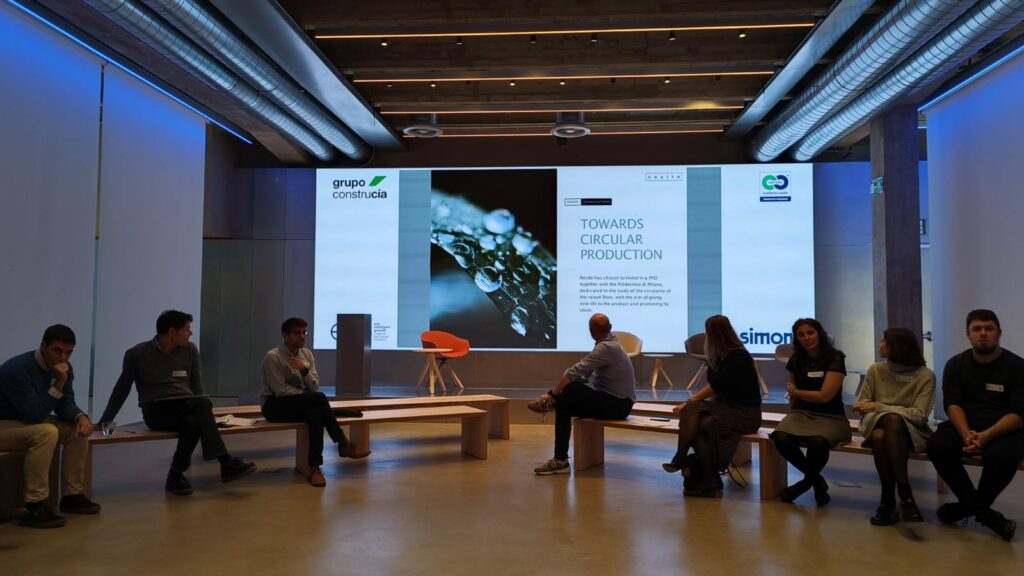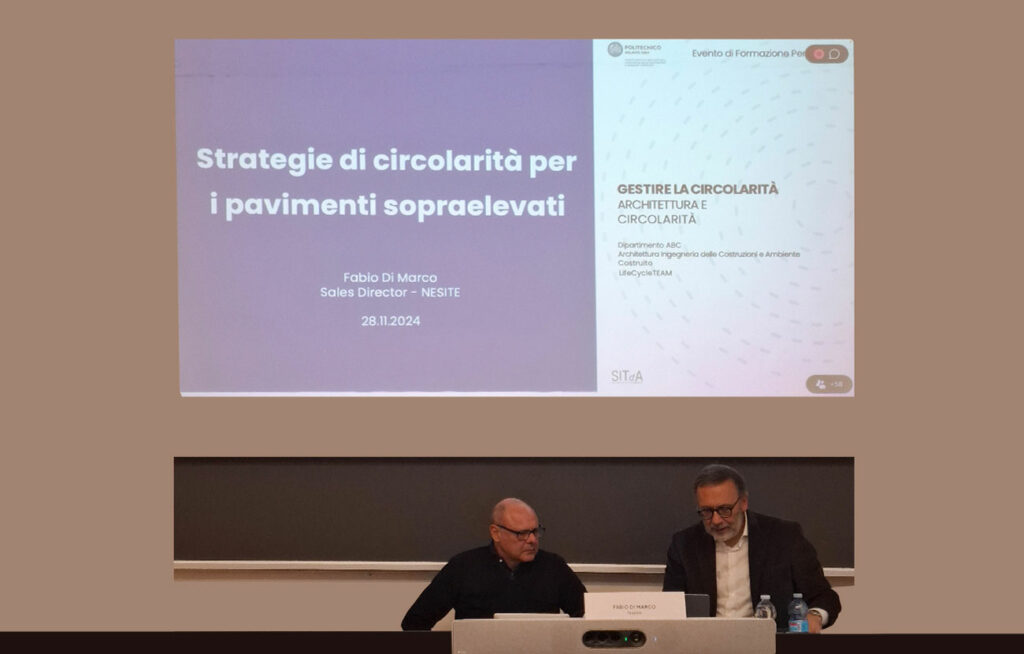
Home / News / PAVIMENTI SOPRAELEVATI GREEN /
Common front for building sustainability in Barcelona and Milan: at the end of November, we had the pleasure of participating in three inspiring events dedicated to the theme of circularity, stimulating meetings that actively involved us, allowing us to offer our contribution in a dialogue that is of fundamental importance today.
Community Forum event – Simon Electric hq, Barcelona

Organized by the Cradle to Cradle Products Innovation Institute in collaboration with Eco Intelligent Growth, the Barcelona Community Forum highlighted the role of Cradle to Cradle certification in improving not only products, but also processes and people. Central to the approach is circularity, which must be integrated from the design stage.
Protocol 4.0, adopted in the Nesite certification pathway, introduces more advanced requirements for all performance categories, including:
- Alignment with advanced chemical regulations, with an updated list of restricted substances to protect the health of materials.
- Updated frameworks to promote global best practices in terms of product circularity and social justice.
- Stricter requirements for air quality and climate protection, incentivizing concrete actions against climate change.
- Sustainable water and land management, to ensure safe water resources and soils usable by people and other life.
Creating a culture of circularity requires the involvement of all players in the construction sector: architects, companies and material manufacturers. Indeed, the construction sector is among the most critical in terms of energy and material consumption, greenhouse gas emissions and waste production, with significant numbers compared to other industries. It is therefore a shared responsibility to take action to reduce its environmental impact and improve its social impact.
circularity forum event – La Pedrera, Barcelona

The Circularity Forum was organized in the Auditorium of the wonderful La Pereira by Grupo Construcia, an organization that has been committed to the development of a circular economy model for years and is now among the leading exponents of responsible change in the sector. The mission is clear: to replace the traditional industrial paradigm with the circular one, through collaboration with other entities that share this vision.
Virtuous cases were presented during the event, such as that of Leuven, Belgium, a city that aspires to become “climate neutral.” Thomas Van Oppen told how, especially in the construction sector, materials can be reused and buildings can be designed with the idea of reuse in mind.
Another key point is the role of manufacturers, who must develop products and installation techniques geared toward longevity and reuse. Of great importance in this vision is the concept of flexible space, of which the raised floor is a protagonist because it allows spaces to be reused for different applications as well, allowing projects to have a longer lifespan.
But how to incentivize sustainable choices now so as not to leave high costs to future generations? The event highlighted the importance of alliances between the academic and business sectors, which are essential to stimulate innovation.
The link between health, biodiversity and construction was also discussed, emphasizing that the global crisis affects not only climate and biodiversity, but also people’s health. The suggested approach is summed up in one sentence, “Let’s think about how to do better, not just how to do less.”
Architecture and Circularity Seminar – Polytechnic of Milan

On the same day as the Barcelona Community Forum, we participated as speakers in the seminar “Managing Circularity. Architecture and Circularity,” organized at the Polytechnic of Milan as part of a series of continuing education events.
During our talk, we delved into the topic of circularity applied to raised floors, analyzing the objectives, critical issues and advantages of this solution.
As a confirmation of our commitment to sustainable innovation, our company also decided to co-fund, as part of the PNRR initiatives, a PhD scholarship within the doctoral program of the ABC (Architecture, Built Environment and Construction Engineering) department of the Politecnico di Milano. This is a thematic PhD fellowship to study circularity in raised pavement systems, with the aim of giving new life to products and promoting their reuse. The research aims to identify the technical, production and organizational conditions necessary to make circular strategies viable and stimulate the market toward sustainable solutions. The study will focus on four main aspects of circularity:
- Circular design, which considers reuse and sustainability from the initial stage.
- Circular production, with a focus on resource optimization.
Circular use, to ensure durability and flexibility of products.
Circular recovery, through end-of-life strategies for materials.
The circular strategies of the 5Rs – Remanufacturing, Reconditioning, Repurposing, Reuse, Recycling – will be the focus of the research. Applied in an integrated way, these actions are key tools for extending the life cycle of buildings and optimizing the resources used.
Nesite will provide its expertise and experience on raised floor systems as the main case study for the development of the doctoral thesis. This project marks another step on the path toward a circular revolution, with the ambition of fostering real and lasting change in the construction industry.